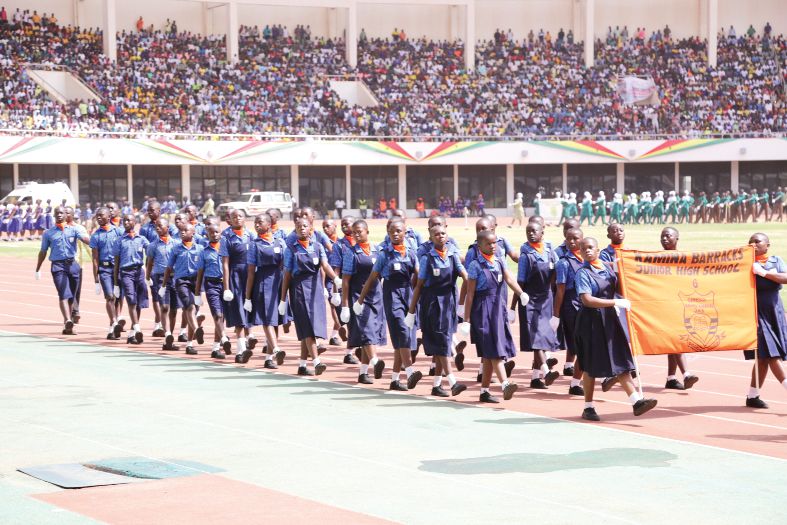
Marching for 63 years, Still relevant?
They stand as symbols of the light lit by our forebears and move their limbs briskly in remembrance of the cause of freedom.
The above personifies the spirit of patriotism inculcated in the youth since 1957 when the country freed itself from the shackles of colonialism.
As schoolchildren prepare feverishly to join the security services and other organised bodies to march past the dais tomorrow when Ghanaians remember the day of their freedom, many people wonder whether or not the celebration of the day with a march past by schoolchildren is still relevant.
While some opine that celebrating the day with a march past is still relevant, others are of the view that the exercise, which forms an integral part of the celebration, has outlived its usefulness and should be scrapped.
A toll on children
A former headmaster, Mr Wilberforce Azumah, who argued against celebrating the day with a march past, described the activity as archaic and retrogressive in this modern times and averred that activities that would not have a toll on schoolchildren could be adopted.
He said because many schools wanted to impress the audiences and win awards, as part of the celebration, school contact hours were devoted towards rehearsals, to the detriment of majority of the schoolchildren.
“We have had a lot of marching for more than 60 years, with its attendant catastrophes during rehearsals and on the actual day of the ceremony. It is high time we paused and asked ourselves whether or not we want to continue with this conservative practice,” he said.
Use cadet corps
A teacher, Mr Wisdom Kwabena Mensah, said although he would not sanction an outright scrapping of the march past, schoolchildren should not be allowed to participate in the march past.
Instead, he advocated that selected cadet corps of such schools should be encouraged to participate, since “they have some level of endurance”.
He said the security services should participate fully in the commemorative march past, since they were trained to withstand the harsh weather conditions, as against schoolchildren who were often unable to withstand the heat, resulting in the collapse of many of them during the parade.
Background
Last year’s celebration of Independence Day at the Aliu Mahama Stadium in Tamale saw 13 schoolchildren collapsing as a result of fatigue and high temperature.
Some individuals belonging to the various security agencies at the parade grounds were carried away on stretchers by First Aid officials at different points.
But the fact still remains that the march past, which has been an integral part of the celebration since 1957, remains as relevant today as it was 63 years ago.
The march past itself first started in the 1900s when the Gold Coast became a member of the British Empire. The parade and the march were to mark Empire Day in all British colonies to commemorate the birthday of Queen Victoria.
People who participated in the post-independence marches still recount with nostalgia the feeling of being selected to participate in the exercise, the feeling of being a Ghanaian and a proud one as such.
Independence struggle
For them, the march past was one of the significant ways schoolchildren associated themselves with the celebration; it gave them a sense of being part of the struggle for independence as they saluted the national flag.
One of such adherents, Ms Diana Bansah, said children must be made to participate in this annual ceremony, stressing: “If we take this very important celebration from them, what will they remember in this independence struggle?”
“Yes, marching by children on that occasion is still relevant because it gives children in their early stages the platform to show their love and patriotism to their country,” she said.
A renowned educationist and former Director-General of the Ghana Education Service (GES), Mr Michael Nsowah, participated in the March 6, 1957 march past in Kumasi, where he was schooling.
Euphoria
He recalled the euphoria about the country freeing itself from colonial rule and the fact that it would no longer salute the Union Flag (the British flag).
He still recollects how some pupils, including him, were selected to march and others wept because they were not selected.
Mr Nsowah said those who were calling for the scrapping of the march past might have a point because for some time now schoolchildren went to march because they would be given Milo to drink after the march past.
He explained that it was so because “we have not been taking the children through how Ghana came into being because for some time the teaching of history as a subject was deleted from the country’s basic school syllabus”.
Mr Nsowah, who is the GES Council Chairman, said the review of the educational curriculum, which had reintroduced history as a core subject, would give the schoolchildren the opportunity to learn Ghanaian history, where we began from and where we were now.
“By learning the history of Ghana, the children will come to associate themselves with the independence story, which will give them the
feeling of nationalism,” he explained, adding that all was not lost.
Advice
Mr Nsowah said with the introduction of history in the syllabus, it should be possible for the learning of the subject to be organised sequentially, such that "as we get close to such celebrations, the sub-topics should be related to particular events to give the students practical understanding".
